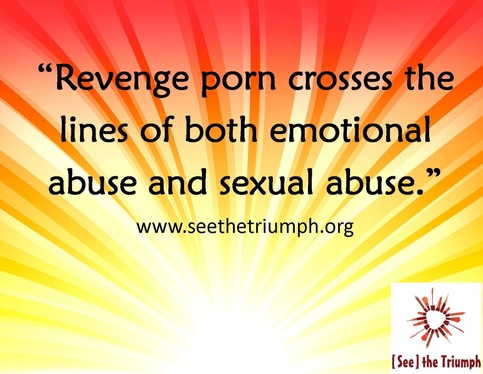|
By Christine Murray, See the Triumph Co-Founder
If you’ve been following the news lately, you’ve likely heard about “revenge porn,” which Wikipedia defines as “sexually explicit pictures, video or other media that is publicly shared online without the consent of the pictured individual. Revenge porn is typically uploaded by ex-partners or hackers.” Revenge porn is one of the many ways that technology can be used as a form of abuse within the context of a current or former intimate relationship. As it’s often depicted in the media, disgruntled former relationship partners take intimate photos and videos and share them publicly and widely through various channels--including web-sites devoted specifically to revenge porn. Those intimate materials may have been obtained voluntarily, such as when someone sends a photo to their partner, or involuntarily, such as if one partner videotaped the couple during sexual activity without knowledge and/or consent. Professionals who work with people who’ve experienced intimate partner violence (IPV) know that IPV can occur between both current and former relationship partners. Revenge porn crosses the lines of both emotional abuse and sexual abuse. For example, consider the following definitions:
Therefore, revenge porn could be considered both a form of sexual abuse--because it involves forced or coerced sexual exploitation--and a form of emotional abuse, in that it is used to humiliate and control one’s partner. It is also a serious infringement of one’s privacy that can have many significant negative social and emotional effects for people who are targeted. One of the participants in our research described the impact of revenge porn on her: “I am powerless to keep him from doing what he pleases with the videos he took of me having sex without my knowledge or consent.” This quote captures the sense of powerlessness and loss of control that may accompany being targeted for revenge porn. Sharing--publicly and spitefully--the most intimate details of one’s sexuality, sexual relationship, and private moments with one’s partner has no place in a healthy relationship. Technology allows that sharing to go far beyond one’s immediate social network and spread literally across the world in a matter of moments. Not only is this a violation of a person’s privacy, it also can lead to safety risks, in that it can lead to stalking, unwanted sexual advances, and harassment by others, including strangers. Some people who are targeted even go so far as to change their names to protect themselves. Unfortunately, laws haven’t yet caught up to technology yet in the case of revenge porn. As Jill Filipovic said on The Guardian, “Right now, the law and our culture are both on the side of those who shame and humiliate women for sport, instead of those of us who just want to go about our normal lives.” Some actions are being taken to create laws to stop revenge porn, such as in Pennsylvania and Illinois. A bill may even see its way into the U.S. Congress. However, until the laws catch up, more actions will be needed at the individual, community, and national level to support people who are targeted, hold offenders accountable, and raise awareness of this important issue. References:
Comments are closed.
|
Archives
July 2024
CategoriesAll About Intimate Partner Violence About Intimate Partner Violence Advocacy Ambassadors Children Churches College Campuses Cultural Issues Domestic Violence Awareness Month Financial Recovery How To Help A Friend Human Rights Human-rights Immigrants International Media Overcoming Past Abuse Overcoming-past-abuse Parenting Prevention Resources For Survivors Safe Relationships Following Abuse Schools Selfcare Self-care Sexual Assault Sexuality Social Justice Social-justice Stigma Supporting Survivors Survivor Quotes Survivor-quotes Survivor Stories Teen Dating Violence Trafficking Transformative-approaches |
Search by typing & pressing enter



 RSS Feed
RSS Feed